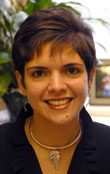Filed Under > Research/Publications
Souto-Manning wins AERA Award for Innovations in Research on Diversity
The American Education Research Association (AERA) has selected Mariana Souto-Manning, Associate Professor of Education in the Curriculum & Teaching Department, to receive its Division K Innovations in Research on Diversity in Teacher Education, for "exemplary innovations in research on diversity."
AERA said Souto-Manning’s research was selected for its “impact, relevance to diversity, and contribution to teacher education” adding “exemplary innovations in research on diversity.” Two of her books published in 2010, Freire, Teaching, and Learning: Culture Circles Across Contexts and Teachers Act Up! Creating Multicultural Learning Communities Through Theatre, served as the basis for her nomination. Together they examine “implications and applications of Freirean culture circles and Boalian theatre to diversity and social justice in teaching and teacher education,” Etta R. Hollins, AERA Division K Vice President, wrote.
Through her “reinvention of culture circles and Boalian theatre,” Souto-Manning “has developed critically innovative approaches to teaching and conducting research in teacher education that are grounded in the practices and realities of teachers,” wrote Hollins, Professor and Kauffman Endowed Chair for Urban Teacher Education at the School of Education at the University of Missouri-Kansas City.
In Freire, Teaching, and Learning Souto-Manning draws on her experiences as a former teacher and current educator and researcher. By examining culture circles across educative sites in Brazil and the United States, she “opens new possibilities for using” them, according to the nomination letter for the award.
Souto-Manning applies teaching methods traditionally used in adult literacy programs in Brazil, to pre-service and in-service teacher education in the U.S., reinventing them in the process. “Her work proposes innovative designs, paired with a generative approach for understanding, practicing, and questioning the transformative power of culture circles in relation to lived experiences, acts of humanization, and the roles played by justice, equity, and diversity in teaching and teacher education,” a supporting letter stated.
Published Monday, Mar. 28, 2011
